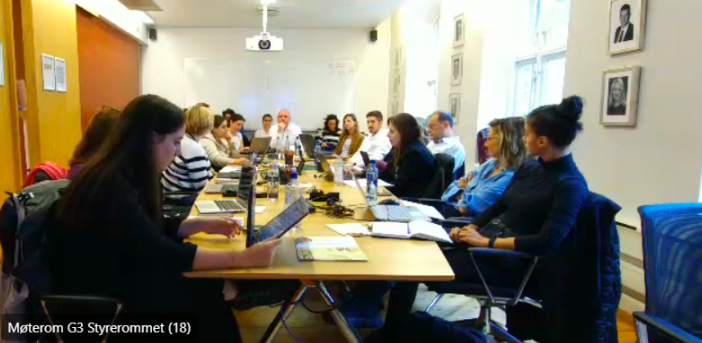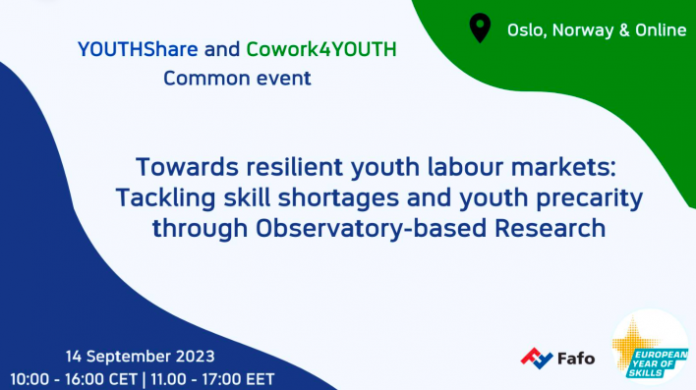On Thursday, September 14th, the common event of the YOUTHShare and Cowork4YOUTH projects “Towards resilient youth labour markets: Tackling skill shortages and youth precarity through Observatory-based Research” in Oslo took place, with plenty of participants and interesting dialogue taking place.
Professor Avdikos, Principal Investigator of Cowork4YOUTH, via online presence, mentioned the Observatories developed by the two projects, and noted that the abundance of data in the Observatories will make them very powerful tools in the hands of researchers, policy makers and practitioners. Referring to the pilot studies of Cowork4YOUTH and the PhD that is in progress in the framework of the project, Professor Avdikos commented that they have firm evidence that coworking spaces and other relevant collaborative spaces seem to play a brokerage role in the labour force. In his introduction, Professor Gialis, Principal Investigator of the YOUTHShare project, said that there is critical understanding of how skills are important in the contemporary job market and also that it is inspiring to see these two projects, YOUTHShare and Cowork4YOUTH, have a firm collaboration.
In his keynote speech, Seamus McGuiness, Research Professor and the Research Area Co-ordinator for labour market research at the Economic and Social Research Institute, talked about labour market mismatches, namely overeducation, undereducation, overskilling, underskilling, horizontal mismatch, skills gaps and skills shortages, and how they raise policy issues, because they can seriously affect individuals, companies and the economy in general. For example, skills gaps and skills shortages could raise the labour costs since employees are not equipped with the knowledge to complete their tasks, whereas vertical mismatch (overskilling) results in lower wages, as well as in “an economy that is operating below its potential”. Professor McGuiness concluded that skills mismatch is a complex and multi-dimensional issue with occasionally very little enlightening data (for example for skills gaps and skills shortages), which is a barrier if we want to achieve a better understanding of the link between “various forms of mismatch and demand side factors”.
In the first session, “The use of online observatories and platforms in social research”, Dimitris Psarologos of the YOUTHShare project presented the Youth Employment Monitor, a WebGIS based platform that includes applications that track youth employment data and employs BI (Business Intelligence) tools to visualize and forecast relevant data. The current basic applications of the Monitor are three: insights, Youth Guarantee reports and interactive youth maps. Next, Mr Psarologos talked about the Cowork4YOUTH Employment Observatory, which is also a WebGIS application that can be accessed by any device and includes socio-economic and socio-environmental data and indices that are provided by official open access sources and calculations by the National Technical University of Athens (NTUA) team. George Sykas who followed next talked about the e-Reslab Aegean Observatory for employment and resilience in the Euro-Med area, and Mr Sermpezis presented its tools: the dashboard, data & graphs, database Web interface and the microdata Web app. The third presentation was about “The YOUTHShare e-mentoring and co-working spaces matching tools” by Stelios Kaznesis, Nektaria Marava and Aimilia Markaki, where the Join2Share platform was presented with its 2 new tools, the workplace matching and the e-mentoring tool.
At the second session, “Youth employment and skills”, Athina Avagianou and George Chatzichristos talked about “Precarious youthspaces and the role of social and sharing economy”. More specifically, the presenters shared research regarding “the reproduction of precarious youthspaces of work”; when and where young people reach specific milestones is not an even process and it also affects regions of “advanced capitalism”. Dr Chatzichristos also talked about the “sense of cosmopolitanism” of young people, where belonging to somewhere is thought to be a characteristic of being constrained. Next, Cowork4YOUTH researcher Dimitris Manoukas talked about “The role of co-working spaces in engaging the youth” and he presented the results of a case study conducted in MakeHUB Licata in Sicily, Italy. The preliminary conclusions included observations about the implementation of “reactive policies” with the aim to address “challenges proactively and creating opportunities for social innovation” and “social innovation as brain gain and youth engagement”. Concluding the session, Effie Emmanouil talked about “Mapping skills in youth labour markets across the EU”, an empirical research on skills supply in Greece, Italy and Spain, with the results showing over-concentration of high skills in the Italian North and metropolitan & industrial regions and over concentration of medium skills in many Greek regions, many South Italian regions and some northern Spanish regions.
The last presentation was about “Youth labour in energy transitioning regions” by Dr Kostas Gourzis and Vassiliki Krommyda, a paper in the framework of Cowork4YOUTH regarding a case study about the Greek region of Western Macedonia. Some of the main results about the region revealed the Public Power Corporation as the “dominant employer”, a “vicious circle” between unemployment and precarious work and that youth depend on family.
The common event ended with fruitful discussion between the participants and the attendees, both on site and online.
 Stay connected with us through our social media: Facebook, Twitter, LinkedIn: @Cowork4YOUTH, and visit our website https://www.cowork4youth.org/
Stay connected with us through our social media: Facebook, Twitter, LinkedIn: @Cowork4YOUTH, and visit our website https://www.cowork4youth.org/


